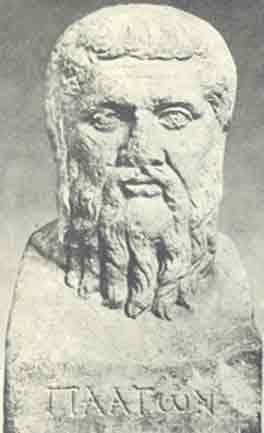People
Philosophers
Plato (427-347 B.C.)
Plato {Platon ~ Πλάτων} (427-347 B.C.) [George Berkeley] [John Locke]. Greek philosopher. Plato’s teachings have been among the most influential in the history of Western civilization.
After pursuing the liberal studies of his day, he became in 407 B.C. a pupil and friend of Socrates [People]. From about 388 B.C. he lived for a time at the court of Dionysius the Elder, tyrant of Syracuse [Place Names].
On his return to Athens [Place Names], Plato founded a school, the Academy, where he taught mathematics and philosophy until his death. The Academy is one of the earliest known organized schools in Western civilization; "a large enclosure of ground which was once the property of a citizen at Athens named Academus {Akadimos ~ Ακάδημος} -- some however say that it received its name from an ancient hero." Aristotle [People] and Epicurus [People] were students there. It operated until it was... "padlocked" by the Byzantine Emperor [List of Emperors] Justinian I in 529 A.D. It is interesting to note that the area where Plato founded his Academy is still called Plato's Academy [Place Names].
His teaching was interrupted by two more visits to Syracuse (367 and 361 B.C.), which he made in the vain hope of seeing his political ideals realized in Sicily.
One of Plato's legacies, and perhaps his greatest, was his dualistic metaphysics, often called (in metaphysics) simply "realism" or "Platonism." Whatever it is called, Plato's metaphysics divides the world into two distinct aspects: the intelligible world of "forms" and the perceptual world we see around us. He saw the perceptual world, and the things in it, as imperfect copies of the intelligible forms or ideas. These forms are unchangable and perfect, and are only comprehensible by the use of the intellect or understanding (i.e., a capacity of the mind that does not include sense-perception or imagination).
Plato's metaphysics, and particularly the dualism between the intelligible and the perceptual, would inspire later Neoplatonic thinkers and other metaphysical realists.
In Plato's writings one finds the heliocentric theory of the universe long before it was advanced by Aristarchus {Aristarhos ~ Αρίσταρχος} (and revived still later and given a scientific footing by Copernicus, Galileo [People], and Kepler). One finds debates concerning aristocratic and democratic forms of government. One finds debates concerning the role of heredity and environment in human intelligence and personality long before the modern "nature versus nurture" debate began in the time of Hobbes and Locke [People], with its modern continuation in such controversial works as "The Mismeasure of Man and The Bell Curve". One finds arguments for the subjectivity -- and objectivity -- of human knowledge which foreshadow modern debates between Hume [People] and Kant [People], or between the postmodernists and their opponents.
Even the myth of the lost city or continent of Atlantis originates as an illustrative story told by Plato in his Timaeus and Critias.
Plato (427-347 B.C.)

04-22-2004